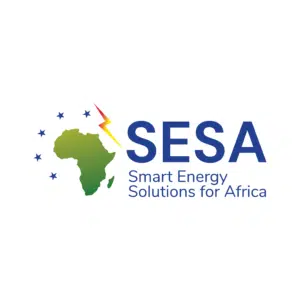Africa is the fasted growing continent on the planet, measured both in GDP as in population, which historically is accompanied with a growth in energy consumption. With an eye on the Paris Agreement and COP26 it is clear the energy should be Low or even Zero Emission. However, it is important this does not stifle the economic growth allowing millions to climb out of poverty. With this in mind the EU funded the SESA project that aims at mitigating climate change while improving access to sustainable energy under affordable, reliable conditions.

-
Project Partners
32
-
Location(s)
Kenya, Ghana, Malawi, Morocco, South Africa, Namibia, Nigeria, Rwanda and Tanzania.
-
Starting Year
2021
-
Duration
4 Years
-
Funder
EU Horizon Europe 2020

SESA is a four-year (2021-2025) EU H2020 funded R&D project designed to combine innovative energy access solutions for a range of applications in both urbanised and rural contexts in Africa. These solutions will include decentralised renewables (solar photovoltaics), innovative energy storage systems (including second life batteries), waste-to-energy systems (biomass to biogas), smart microgrids, (micro) mobility solutions, climate-proofing, resilience and adaptation, and rural internet access.
SESA focusses on testing, validating and replicating those energy innovations through co-developed demonstration actions in 9 sites across the continent (1 Living Lab for testing, 4 for validation and 4 for replication).
The collaborative project is the result of a strong partnership between leading European and African universities, research centres, industry actors, local governments, knowledge and implementation organizations and networks.
Objectives
The main goal of SESA is to support a diversity of affordable solutions that help provide access to reliable, affordable, and sustainable energy services for all, creating new business opportunities and developing concepts that can directly contribute to a low-carbon development. It further provides policy makers with recommendations aiming at creating a favourable regulatory environment to ensure long-term impacts of the solutions developed. In addition, a key deliverable for the project is the SESA Toolbox, which will contain materials relating to the following main building blocks:
- Impact assessment
- Capacity building
- Business plans and models
- Innovations tested in demonstration actions
- Design, operations and management for different solutions
- Financing & funding options
- Policy support
Cenex NL’s key contributions
Cenex NL leads the work package responsible for the development of the key repository of the project, the so called “SESA Toolbox”, and the evaluation of the project results available in the toolbox. Our team will be involved in three tasks:
- Build a scalable and harmonised toolbox for advanced implementation, management and operation strategies of efficient sustainable energy solutions.
- Develop an evaluation framework based on the Life Cycle Assessment (LCA) methodology to quantify and compare the environmental impacts of the proposed solutions.
- Assess the impact of the solutions developed in at least five the demonstration and validation projects using the framework developed in the previous task.
This project has received funding from the European Union’s Horizon 2020 research and innovation progamme under grant agreement No 101037141

